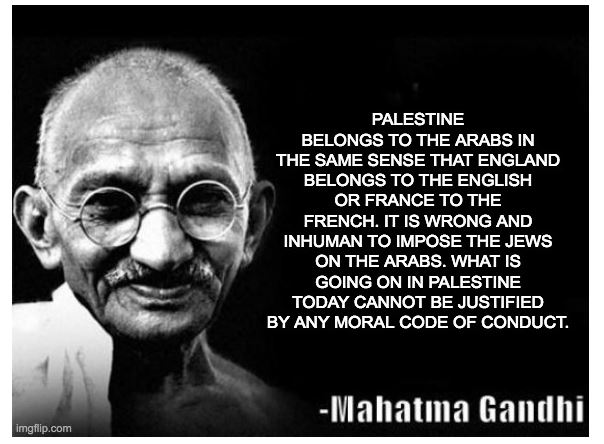Note4Students
From UPSC perspective, the following things are important :
Prelims level: NA
Mains level: Israel-Palestine Issue

Central Idea
- Mahatma Gandhi’s perspective on the Israel-Palestine issue has been a topic of extensive debate over the years.
- His article, ‘The Jews,’ written in 1938, offers insights into his complex views on the matter.
- Gandhi’s sentiments regarding the Jewish people, the Holocaust, and the creation of a Zionist state in Palestine are subjects of scrutiny and admiration, shedding light on his unwavering commitment to non-violence.
Gandhi’s Sympathy for the Jewish People
- Historical Persecution: Gandhi expressed deep sympathy for the Jewish people who had endured historical persecution due to their religion. He likened their mistreatment by Christians to the plight of untouchables in Hinduism.
- German Persecution: Gandhi went further, describing the German persecution of Jews as unparalleled in history. He voiced concern over Britain’s appeasement policy toward Adolf Hitler and asserted that a war against Germany, if necessary to prevent Jewish persecution, would be justifiable in the name of humanity.
Opposition to a Zionist State in Palestine
- Violence and Settlement: Gandhi firmly opposed the imposition of Jews on Arabs in Palestine, condemning it as inhumane. He believed that the settlement of Jews, facilitated by Britain, was inherently violent and could not be achieved through force.
- Need for Arab Goodwill: Gandhi insisted that Jews could only settle in Palestine with the goodwill of the Arab population, without the assistance of British military force.
- Antithetical to Jewish Rights: He argued that the idea of a Jewish homeland in Palestine contradicted the Jews’ struggle for rights in other parts of the world. Gandhi questioned whether Jews, who had settled globally, would appreciate being compelled to leave other regions for a singular homeland.
Influence on India’s Foreign Policy
- Wider Anti-Imperialist Sentiment: Gandhi’s stance on Palestine resonated with leaders across the Arab world and anti-imperialist movements globally. The Balfour Declaration of 1917, promising Jews a homeland in the British Mandate of Palestine, drew criticism.
- Impact on Nehru: Jawaharlal Nehru, India’s first Prime Minister, was profoundly influenced by Gandhi’s views. Gandhi’s anti-imperialism and his perspective on the Israel-Palestine issue shaped India’s foreign policy for decades.
- UN Resolution and Recognition: India voted against UN Resolution 181, which proposed the partition of Palestine between Jews and Arabs. Although India recognized the state of Israel in 1950, it was not until 1992, under Prime Minister P. V. Narasimha Rao, that official diplomatic relations were established.
Conclusion
- Mahatma Gandhi’s complex and empathetic stance on the Israel-Palestine issue reflects his unwavering commitment to non-violence and his deep sympathy for the Jewish people.
- His opinions on the matter, rooted in anti-imperialism and a profound sense of humanity, played a pivotal role in shaping India’s foreign policy and continue to be subjects of historical significance and debate.
Get an IAS/IPS ranker as your 1: 1 personal mentor for UPSC 2024
